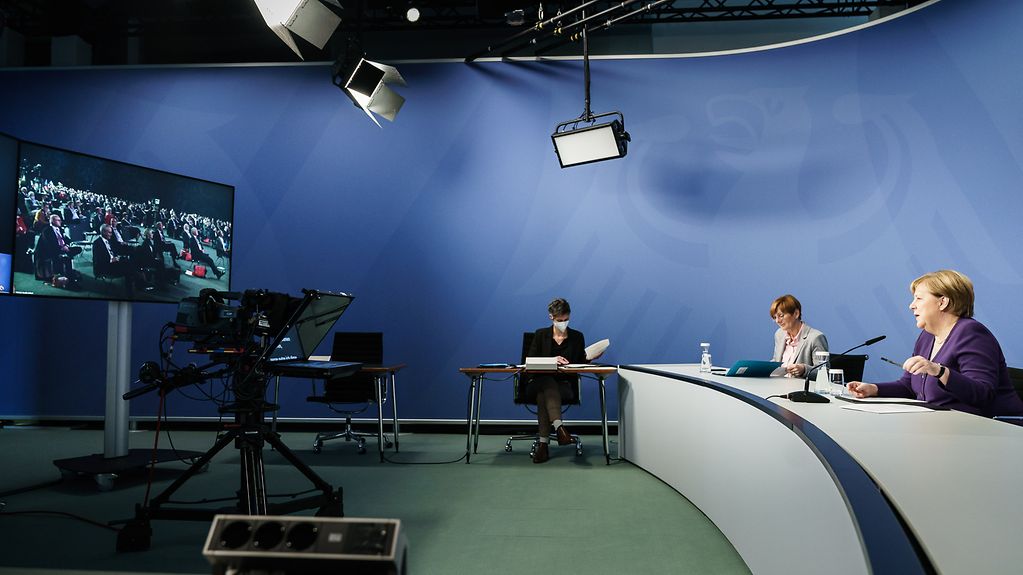Annual General Meeting of the Association of German Cities
In a speech at the Annual General Meeting of the Association of German Cities, Federal Chancellor Merkel stressed that the current pandemic situation was dramatic. “The fourth wave is hitting our country with full force,” said Merkel. She set out concrete steps that were now needed.
3 min reading time

Expressing thanks to strong local partners: Federal Chancellor Merkel attended the meeting of the Association of German Cities via video link.
Photo: Federal Government/Denzel
Federal Chancellor Merkel thanked the cities and municipalities for their work during the coronavirus pandemic. Local authorities were facing enormous challenges during these “very difficult weeks” in particular, said the Federal Chancellor, adding that the public health offices were “the pandemic coordination centres on the ground”. Merkel attended the Annual General Meeting of the Association of German Cities via video link.
Tireless efforts during the pandemic
“I’d like to take this opportunity to thank you and all your staff for your tireless efforts to tackle the pandemic on the ground,” said the Federal Chancellor.
“And it isn’t over yet – on the contrary,” Merkel said. The current pandemic situation was dramatic, stressed Merkel: “The fourth wave is hitting our country with full force,” she said, noting that the consultations with state premiers this Thursday were “of the utmost importance” and “overdue”.
Action should not be delayed until ICUs are full
In particular she called for a threshold to be set for additional containment measures. Without a threshold, the agreed index for the number of COVID-19 patients admitted per 100,000 of the population in seven days would remain “a paper tiger”, said Merkel, adding that it would be “catastrophic” to delay action until ICUs were full.
It was also crucial to make progress on vaccinations, said the Federal Chancellor: “It’s still not too late to opt for a first vaccination,” she added. At the same time, national efforts were now needed to administer booster vaccinations in cases where initial vaccinations were given some time ago, she said, noting that scientific data from Israel and recent developments there indicate that booster vaccinations were capable of breaking the wave of infections.
Avoiding overload of the healthcare system
The Federal Chancellor expressed concern about the situation in some federal states. The primary goal was to protect lives by avoiding overload of the healthcare system, said Merkel: this meant ensuring that both COVID-19 sufferers and other patients were able to receive the best possible treatment.
Beyond the pandemic, the Federal and Länder governments and the municipalities were of course responsible for many aspects of community life, said Merkel: “In particular, this involves ensuring equal living conditions, so it affects countless areas of our lives,” said the Federal Chancellor, including:
- housing, renting and building
- urban development funding, also for inner-city areas
- stable finances at the municipal level
- basic public services, infrastructure, mobility
- strengthening social engagement
“The challenges we face at the municipal level remain complex and demanding,” said Merkel. Digitalisation, the attractiveness of city centres, sound municipal finances, security for all citizens on the roads, in their homes and on the internet – these were just a few examples that showed how important it was for the Federal Government, the federal states and the municipalities to work closely together, said the Federal Chancellor.
The Association of German Cities is one of the three central municipal associations and represents the interests of all autonomous cities as well as most cities and towns that belong to a district – some 3,200 cities and municipalities in all with a total population of nearly 53 million.
The Annual General Meeting is the association’s supreme body. It convenes every two years, this year’s motto being “At the centre of our lives. Germany’s cities and towns”. The President of the Association of German Cities is Burkhard Jung, who is also Mayor of Leipzig.